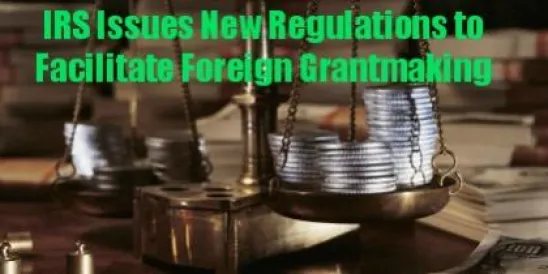New rules expand the class of tax practitioners qualified to issue good-faith determinations regarding foreign-grantee equivalency; IRS seeks comments on further amendments to current regulations.
On September 24, the Internal Revenue Service (IRS) issued proposed regulations expanding the class of qualified tax practitioners who may assist private foundations to make foreign equivalency determinations (equivalency determinations) for grants to foreign charities.
Secretary of State Hillary Clinton suggested that the new regulations will pave the way for the creation of centralized equivalency determination information repositories that would enable foundations to rely on third-party equivalency determinations, such as NGOsource.[1] In her remarks about the creation of a new Global Philanthropy Working Group to promote the growth of independent civil society internationally, Secretary Clinton said that "although it's not specifically addressed in the new rules, this change will clear the way for foundations to set up organizations that can serve as repositories of this determination, meaning this would only need to be done one time. And [the U.S. Departments of the] Treasury and State will work together with you to try to create such a clearinghouse of information that would then be accepted as reliable."[2]
Background
Federal tax law provides that when a private foundation makes a grant to a foreign organization (other than certain governmental organizations), the private foundation generally must determine that the foreign organization is equivalent to a U.S. public charity or else the foundation must exercise expenditure responsibility with respect to the grant.[3] Under current law, a private foundation may make an equivalency determination using either an opinion of legal counsel or an affidavit from the foreign grantee organization.
Grantmaking organizations and their representatives have urged the IRS either to make such determinations itself for the benefit of grantmaking private foundations or to amend the regulations to make the process more cost-effective.[4]
The proposed regulations (1) broaden the class of tax practitioners upon whose written advice a private foundation may rely for purposes of making an equivalency determination and (2) invite comments on several issues, including whether to eliminate the use of affidavits from foreign grantees for equivalency determinations and what the expiration date should be for equivalency determinations.[5] A private foundation may rely on these proposed regulations for grants made on or after September 24, 2012.
Qualified Tax Practitioners Under the Proposed Regulations
Previously, only counsel of the grantor or grantee could provide an equivalency opinion. Now, any "qualified tax practitioner" who is subject to the regulations governing practice before the IRS, known as "Circular 230,"[6] may provide advice for use in making an equivalency determination. These qualified tax practitioners include attorneys, certified public accountants, or enrolled agents.[7] Foreign counsel will no longer be included in this class unless they meet the requirements of a qualified tax practitioner.
The IRS stated that the class of practitioners now permitted to provide written advice regarding good-faith determinations is "expected to make it easier and less costly to obtain professional tax advice that can be used as a basis to make a good faith determination."
Issues for Future Guidance
The IRS is considering making further amendments to the regulations to no longer permit equivalency determinations based on the affidavit of the foreign grantee, as it believes that affidavits may be a less reliable basis for making an equivalency determination than an opinion from a qualified tax practitioner. The IRS, however, concedes that affidavits can be less expensive and burdensome than obtaining an opinion from a qualified tax practitioner, even under the expanded definition, particularly for smaller foundations or smaller grants. The IRS is therefore requesting comments on this issue, and anyone who might be impacted by such an amendment should consider submitting comments.
Additionally, the IRS is requesting comments on the length of the period during which a private foundation may rely on written advice—for example, 12 months from the date of the written advice. Such a time limit would require the private foundation to seek a renewal of the equivalency determination from the tax practitioner prior to making further distributions. Comments on the appropriateness of such a limit generally, as well as the length of the reliance period are requested—currently, no specific time limit is proposed.
The IRS is also requesting comments on whether the standards in Revenue Procedure 92-94 should be modified to account for changes in the public support test and whether guidance regarding the timeframe for gathering information upon which written advice is based should be provided in the regulations or in guidance published in the Internal Revenue Bulletin.
Comments and public hearing requests are due by December 24, 2012.
The Exempt Organizations Committee of the Taxation Section of the D.C. Bar Association will host a luncheon to discuss the new regulations on Thursday, October 4, from 12:00 to 1:30 p.m. at the D.C. Bar Conference Center, 1101 K Street, NW, Washington, DC 20005. Those not able to attend in person may listen and participate via webinar.[8]
[1]. NGOsource is a project of the Council on Foundations, a nonprofit membership association of grantmaking foundations and corporations, and TechSoup Global. See NGOsource, Overview, available here.
[2]. U.S. Department of State, Hillary Rodham Clinton's Remarks at the Launch of the Department of State's Global Philanthropy Working Group (Sept. 24, 2012), available here.
[3]. See I.R.C. § 4945(d); Treas. Reg. § 53.4945-5(a)(5); Rev. Proc. 92-94. A private foundation may also make grants to a foreign government (or instrumentality or agency thereof) and grants to an international organization designated as such by executive order pursuant to 22 U.S.C. § 288 without exercising expenditure responsibility.
[4]. See, e.g., Advisory Committee on Tax Exempt and Government Entities, Report of Recommendations (June 10, 2009), available here; Letter from Janne Gallagher, Vice President and Gen. Counsel, Council on Founds., to Emily Lam, Attorney Advisor, Office of Tax Policy, U.S. Dep't of Treasury (March 22, 2010), available here.
[5]. Reliance Standards for Making Good Faith Determinations, 77 Fed. Reg. 58,796 (Sept. 24, 2012) (to be codified at 26 C.F.R. pt. 53),available here.
[6]. Regulations Governing Practice before the IRS (Circular 230), 31 C.F.R. pt. 10 (June 3, 2011), available here.
[7]. An enrolled agent is a person who may represent taxpayers before the IRS by either passing a three-part comprehensive test covering individual and business tax returns or through experience as a former IRS employee.
[8]. Please see the following link for more information and to register for the program.






 />i
/>i
